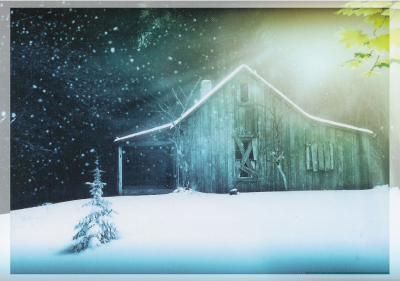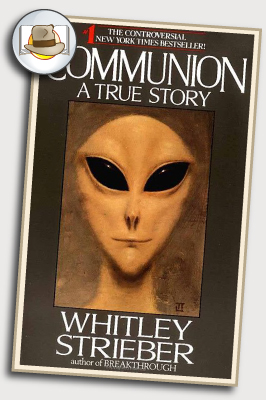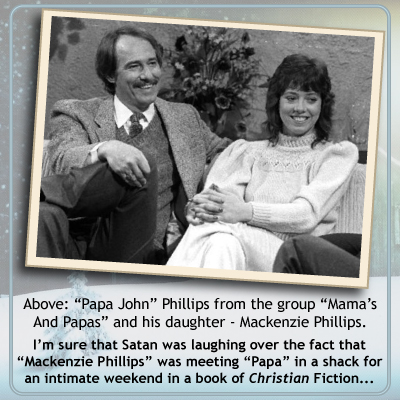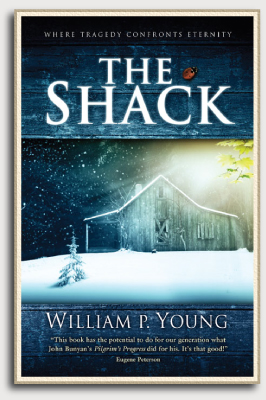"The Shack: Where Tragedy Confronts Eternity" By William Paul Young (2007)
Eric Renderking Fisk - Reviewed July 2011
![]()
There’s been a lot of talk about this book in some of the circles that I run in, especially in my former church. I've heard a lot of vague things about it, about "Papa" and it's message but it wasn't until recently that I new the specifics. It wasn't until joining a mid-week mid-morning “bible study” group about this novel that I found out that this is essentially the “Rosetta Stone” of the new emergent church movement. I started this literary journey because I wanted to know what all the fuss was about. In the end I left the church I enjoyed for the past year because I was left with the question; if the leadership of the church is promoting a book with some deeply heretical messages; then what else is going on? What other watered-down theology is slipping under the radar?
“The Shack” is sold as “Christian Fiction.” It’s also labeled as harmless, you just take away the wheat and leave behind the chaff. Be sure to take the good and leave the bad… that’s all. It’s just a book that uses a couple of metaphors to explain the Holy Trinity. If you have a problem with this book, as I’ve been told by some of the leaders of my former church, then the problem is with you. It’s not the book since its helped so many people “understand” the trinity. Thanks to “The Shack,” God has become more approachable to fresh Christians and more on “our level.”
But is it God, or something else? If you're a new Christian and not well versed in scripture or easily seduced by prose written in the style of young adult fiction, how can you expect to discern the good from the bad or the heresy?
Where Tragedy Meets Heresy
The message of this book is that God who calls himself “Papa” and “Elousa” invites Mackenzie Allen Phillips to the place where his abducted daughter was possibly raped but definitely murdered before the body was dumped in a location that’s revealed by the end of this book. The Shack itself is transformed from a wooden structure hardly suitable for human habitation for winter time to a spring time setting where everything is green or in bloom and the shack is converted into this beautiful country home. From the description written by Wm Paul Young; heaven on Earth is clearly a Thomas Kincaid painting.
Once inside the transformed shack, Mack actually meets “Papa” who also likes to go by the name “Elouisa” and is in fact the perfect likeness of Aunt Jemima. I’m not saying that for shock value; it’s because that’s how the character was written. Papa Elouisa speaks with southern slang and mannerisms that is one-part Hattie McDaniel’s “Mammy” from “Gone with The Wind,” and “Mother Abigail” from Stephen King’s “The Stand.” She’s constantly cooking and cleaning “The Shack” serving up pearls of wisdom along with her fabulous down-home meals. This novel is shamelessly politically correct; Mack is the angry Caucasian man with a background in divinity studies and is corrected and schooled on the nature of God and the universe by an over-weight black house keeper, a Middle-Eastern/Hebrew carpenter and an Asian gardener.

According to the author, his collaborators, and the books apologists – if you have a problem with this, then the problem is with you. Forget for a minute that I might have problems with the way God has been depicted by Michelangelo in The Sistine Chapel or by Douglas Adams in “The Hitchhikers Guide To The Galaxy” series. I also have issues with the “Oh, God” movies starring George Burns and Morgan Freeman’s roles in “Bruce Almighty” and its sequel.
The defenders of this book elsewhere on the internet love to use the word “racism” for those who have problems with this book. If you have problems with “The Shack” for legitimate and theoretical reasons, it must really mean that you have a problem with “Papa” being a black woman. Since this charge of racism is defenseless, that has ended a lot of debates about his book around the internet.
By the time the reader gets to the end of “The Shack,” there’s a euphoric rush that comes with ending a lot of endurance tests. In many ways this is an emotional marathon with high and low extremes. The obvious low-point is the abduction, possible rape, and eventual murder of the main character’s daughter. The emotional highs of this book come in many forms such as seeing that same daughter is “alive and well” in the afterlife playing with other children in a little patch of heaven.
Another emotional high of this book is when Mackenzie Allen Phillips reconciles with his own violent and abusive father who died after Mack put poison in all the bottles of alcohol. In turn Papa asks Mack to forgive the man who abducted, abused, and eventually killed his daughter before dumping her body like trash. "Mack, you have to forgive him so I can go to work on him! You have to forgive him so I can redeem him!" Papa exclaimed. So… what if Mack can’t forgive the “Little Ladykiller,” Does that mean that Missy’s murder can’t be redeemed by Papa? "We'll, how about if I off myself now and we can both go to hell together?" What about that, Papa?

There’s a bit of “Quid-Pro-Quo” and tit-for-tat going on between Mack and Papa… since Mack has been forgiven for his sin of poisoning his father, Mack must do the same for the man who killed his own daughter.
Which brings me to the over-all philosophy of this book and The Gospel According To William Paul Young, the author of this book.
First: There is no such thing as “sin” nor does God punish those who do sin. The guilt we feel is punishment enough. There is no “good” or “evil,” either; it’s all relative. What's evil in your eyes is good in mine. Papa practices moral relativism.
Second; Papa is “especially fond” of all his children. Yep, all of them; S/He’s looked really hard to find one that S/He isn’t fond of, but hasn’t found one yet. So S/He’s especially fond ofAdoph Hitler, Joseph Stalin, Pol Pot, and all the people throughout history who have butchered others in their tyrannical efforts to remove God and replace Him with themselves. Fredrick Nieche who said “God Is Dead” or tried to deny the existence of God? Papa is especially fond of him, too. Papa is especially fond of Missy, and especially fond of the man who abducted, possibly raped, and then murdered Missy.
Third; The true nature of Papa Elouisa, Jesse (Jesus) and Sarayu (the Holy Spirit) is pure humanity. They are pure human beings and nothing more after descending down from Heaven to roll up their sleeves and get their hands dirty while trying to fix the mess they created in the Garden of Eden. They failed and let down Adam and Eve… “Papa, Jesus and Sarayu” personally take responsibility for their failure and get everything back on track.
Fourth: According to Papa, there is no hierarchy in Heaven nor Earth; the role of Papa, Jesse and Sarayu is to be servants of all those that they are especially fond of. Also, Papa can and often does change his appearance to suit the needs of the people S/He’s serving. If it suits Eric Renderking Fisk to show up at his house looking just like Gene Roddenberry with a barbeque apron that says “Kiss The Cook” than that’s exactly what Papa can – and will – do. It’s Papa’s nature to be subservient to His creation.
In the end the conflict and “great sadness” Mack feels is resolved by the end of the book; with the help from “Papa” they’re able to find Missy’s body and through forensic evidence track down her killer. Mack’s experience at “The Shack” also transformed the lives of the people around him.
If the book is taken to heart then what’s left for the reader when the books is finished is a jumble of mixed but powerful emotions.
For The Bride Of Christ: Something Old, Something New, Something Stolen, Something Blue...
 This book really got under my skin and this lengthy break down that I wrote was more about me coming to terms with a story line that blatantly ripped off bits and pieces of other recent works of fiction. Wm. Paul Young isn’t even ashamed about it as he's often peppering stolen cuts of other people's literary ideas with over-used cliché’s and served with a writing style that’s appropriate for 8th Graders.
This book really got under my skin and this lengthy break down that I wrote was more about me coming to terms with a story line that blatantly ripped off bits and pieces of other recent works of fiction. Wm. Paul Young isn’t even ashamed about it as he's often peppering stolen cuts of other people's literary ideas with over-used cliché’s and served with a writing style that’s appropriate for 8th Graders.
There were moments when I had to stop reading or listening to the audio version from Audible and digest what I just read or heard. I was often taken aback by the notion that Wm. Paul Young blatantly borrowed or stole thoughts and ideas from Carl Sagan’s “Contact,” (more so from the book, and not the motion picture,) and Whitley Strieber’s “Communion.” If anything, “The Shack” is for Christian people who read Mr. Strieber’s “Communion” and wanted to receive its message but wished that there was a watered-down version sanitized with the current Churchianity buzz words to make it more palatable. In and of itself that’s reason enough to dislike this book but my feelings for it were beyond that; I went beyond hating it.
No matter how hard I tried I couldn’t reconcile the blaring contradictions between this book and the Bible but that wouldn’t have been a issue if this wasn’t a book labled “Christian Fiction.” If this was mere fiction, it wouldn't be any more of an issue than "Star Wars," "Harry Potter," or "Lord Of The Rings." Slap the Christian Fiction label on it with an afterward from the author that says "The story is fiction, but the conversations are true," and you'll have the hook in less decerning readers set deep in their mouths.
Much of the dialog in “The Shack” crosses into heretical territory, and then builds a house there. William Paul Young also borrows names from Paganism and Hinduism and lends them to the characters of “God” and “The Holy Spirit” which leads me to wonder if this isn’t an attempt to create indoctrination literature for the “New World Order Religion” and “Universalism For Dummies.”

The story itself borrows from many Eastern legends. There are many legends about men going to Mount Kailash and asking the god Shiva hard questions. In one such legend, a father asks Shiva; “Why did you take my daughter?” Shiva answers: “We took her so you would come up here and ask why we took her… my reason for having you up here suits me.” Again, what is Mr. Young trying to do with this book?
There's also the unfortunate choice for the name of the main character of this novel, "Mackenzie Phillips." The same name as the actress from the late 70's sitcom; "One Day At A Time" and the daughter of "Papa John" from the music group from the late 1960? Google the name of the actress and look up her relationship with her own "Papa" and get back to me when you realize how unfortunate the name for this character really is. I highly doubt that was a mistake since the author claimed that he worked on this book for years by himself before working with a small collaborative team. Words and names mean something and I’ll be struck by lightning before I can be convinced this was a mere coincidence.
What Do I Need You For, Then?
The Shack leaves the reader with a watered down version of the gospel. According to Wm. Paul Young, there’s no condemnation, there’s no guilt, no fear of hell, and eventually no need for repentance since “Papa” has no expectations of his or her creation. According to this book, there’s no need for a bible; just a relationship between Papa, Jesus and Sarayu with their creation they want to be submissive to. The nature or the theme of “The Shack” is not to make God more approachable, it’s to bring Him (or her) down to our level. Papa, Jesus and Sarayu are our fishing buddies, someone to pal around with and hang out at the saloon. The reverence for The Creator of The Universe and the Savior of humanity is diminished, eroded and eventually erased. Just as Charles Dickens managed to take Christ out of Christmas via “A Christmas Carol,” Wm. Paul Smith takes The Father, Son, and Holy Ghost and turns them into earthy stereotypical characters.
“The Shack” houses a seductive and dangerous message. I can lie, steal, cheat on my spouse, and even murder and God has no problem with that; there’s no such thing as “sin” according to Papa. I don’t have to improve myself since Papa has no expectations of me, I have no reason to strive for something better. I’m free to go back to being a screw-up. What’s the point of Christ then? What’s the point in believing in Him now if I’m going to be redeemed after death? Some might even say “I don’t need anything now that I have this book.”
“The Shack” is a deceptive book. Those of us who haven’t been consumed by its empty “feel good” message and actually paid attention to the warnings printed in the bible consider this as the deceptive false doctrine of the End Times. If you’re a “Christian” and you’re familiar with scripture, then you know exactly what this “Christian Fiction” book really is.
Links
Discuss "The Shack" on The Electric Speakeasy
"A Review of The Shack," by Tim Challies.
The Hidden Heresies of "The Shack" Book
The Dysfunctional Parrot: "The Shack - aka. The postmodernist guide to the nature of God." | JUNE 23, 2011
The Return of the Black Madonna: A Sign of Our Times or How the Black Madonna Is Shaking Us Up for the Twenty-First Century,” Rev. Matthew Fox, Ph.D | 2006
Herescope: “THE SHACK, "Elousia," & the Black Madonna - IMAGINATION, IMAGE, AND IDOLATRY” By Pastor Larry DeBruyn | Wednesday, July 02, 2008
